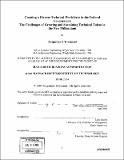Creating a diverse technical workforce in the Federal Government : the challenges of growing and sustaining technical talent in the new millennium
Author(s)
Townsend, Jacqueline S. (Jacqueline Suzanne), 1965-
DownloadFull printable version (3.682Mb)
Other Contributors
Sloan School of Management.
Advisor
Lotte Bailyn.
Terms of use
Metadata
Show full item recordAbstract
The United States is a world leader in the global scientist and engineering enterprise, however with a shortage of US workers prepared to fill scientist and engineering positions in the future, other nations are preparing themselves to challenge this strong US economic strength. Technically skilled international workers are beginning to fill the void within corporate America, including an increase in global white collar outsourcing, but while this action may adversely affect our nation's supply of available technical talent, the Department of Defense (DoD) faces additional challenges in their pursuit of the "best of the best." While the war for talent exists nationally, it is only exacerbated for the DoD by the department's unique requirements, specifically the non-traditional technical talent required and requirement for US citizenship. Coupled with these challenges, are changing diversity statistics that are not encouraging for future workforce shaping initiatives. With the recent cutbacks to the S&E workforce and many organizations facing retirement eligibility statistics nearing 50%, the technical workforce dynamics are changing. In an attempt to create a diverse technical workforce to replace the aging workforce, DoD faces several challenges. Not only will this war on talent attempt to attract scientists and engineers, but a cross-section of social groups in this field as well. In the course of developing their own diverse workforce, the Federal Government has yet another challenge that can hinder their ability to successfully hire this highly desirable talent: private industry. While private industry can offer higher salaries, and perceivably more benefits, the federal government is challenging this once stalwart opponent for the war on talent. (cont.) This thesis will examine the organizational shifts in the workforce structure of engineers and scientists positioned in the government with respect to the recruiting, retention and advancement of underrepresented social classes and provide recommendations through initiatives and best practices to further advance and strengthen underrepresented minorities in the science and engineering workforce within the United States Air Force and the Department of Defense.
Description
Thesis (M.B.A.)--Massachusetts Institute of Technology, Sloan School of Management, 2004. Includes bibliographical references (leaves 72-79).
Date issued
2004Department
Sloan School of ManagementPublisher
Massachusetts Institute of Technology
Keywords
Sloan School of Management.